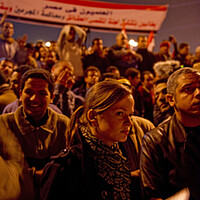Crackdown on Cairo's Morsi supporters stalls
Loading...
| Cairo
Amid apparent division over whether and how to break up two protest camps full of supporters of deposed President Mohamed Morsi, Egypt's leaders have not yet carried out what rights advocates fear will be a violent crackdown.
Anonymous security officials warned yesterday that police could forcibly disperse two protest camps as early as dawn today, but thousands of supporters of Mr. Morsi's Muslim Brotherhood still filled the camps today – and the police never came.
The military and interim government have been locked in a standoff with the Brotherhood since the military ousted Morsi on July 3 after massive protests against the former Brotherhood leader. His supporters have refused to leave their camps until he is reinstated, and as the government signaled in recent weeks that it would remove them, they merely increased their fortifications. Thousands of people remained overnight in the larger camp surrounding Rabaa Al Adawiya mosque in Cairo's Nasr City neighborhood.
Emad Shahin, professor of public policy at the American University in Cairo, says security officials may have been trying to scare protesters into leaving the camps. The presence of several civilian figures in the interim government who are against a violent dispersal of the protests may have also delayed the move, he says.
“The numbers [of protesters] have increased with every warning,” says Dr. Shahin. “Their state of readiness prevents an easy crackdown. So the implication is if a crackdown happens, and there will be huge numbers there, most probably there will be a large number of victims fallen. That might lead to the isolation of this government at the international level.”
At the end of July, the interim cabinet authorized security forces to take “all necessary measures” to disperse the protests, but two people familiar with official deliberations said officials are debating how to clear out the protests while avoiding a high death toll and the resulting international backlash. Mohamed ElBaradei, the former head of the United Nation's nuclear watchdog – who is now a deputy vice president in the interim government – and Ziad Bahaa El Din, a deputy prime minister, have both argued against a violent dispersal of the protests.
The fear of a high death toll if security forces break up the sit-ins was heightened by two incidents last month, as well as a warning last week. In the first, military and police killed at least 54 protesters gathered near a Republican Guard building where they believed Morsi was being held. In the second, security forces killed more than 80 protesters when they tried to cut off a major road.
Last week, the interim government said that two weeks of foreign diplomatic efforts aimed at ending the standoff without a violent crackdown had failed, and the protests would be ended by force.
But at the Rabaa Al Adawiya protest camp in the early hours this morning, the mood was not tense. One group of women chanted “Islamic, Islamic!” while others, including families with children, listened to speakers railing against army chief Gen. Abdel Fattah el Sisi from a stage set up near the mosque.
The camp has grown more permanent in recent weeks as smaller tents have given way to large, wooden-framed ones, and latrines and a children's play area have been built. Protesters have also further fortified the perimeter with sandbags, walls bolstered by cement, and heaps of paving stones.
Brotherhood leader Amr Darrag said if the warnings are intended to scare protesters into leaving, they will not work. “People who are staying are determined to stay,” he said. “They don't care about the threats coming from the other side. They are determined to stay and practice their constitution right to freedom of expression.”
“They can disperse a couple of sit ins, but they cannot disperse the idea of sit ins and protest in the minds of people. People will just keep doing it,” he said. “They know it would probably start another wave of protests across the country.”







